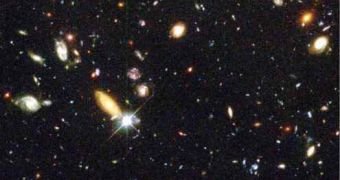In a recent article for the New Scientist publication, there is an interesting scientific explanation to the famous (albeit rather theological) question posed by Saint Thomas Aquinas (1225-1274), "Why is there something rather than nothing?". However, the answer does not involve God, but rather how the universe was built, although some could see a strong link between the two. The author of the short study is Lawrence M. Krauss, a Foundation professor at the School of Earth and Space Exploration and the Physics Department, and director of the Arizona State University's Origins Initiative.
Scientists have been trying to determine for a while now whether our universe is open, closed or flat, with more focus and bias towards the third element, by attempting to calculate the amount of dark matter, since Einstein's general relativity theory links the geometry of the universe to its mass and energy. Too little dark matter would yield an open, ever-expanding universe, while too much would generate a closed, collapsing one.
A flat one is somewhere in the middle, with its matter amount (which still needs to be computed) slowing its expansion until it eventually stops. The explanation also takes into account Alan Guth's term of inflation, which causes our universe to be flat, like inflating a ball decreases its surface curvature and makes it flat. Another factor proposed by Guth which should be considered is that in such a flat universe, the total gravitational energy equals zero.
An object that has been thrown upwards possesses two kinds of energies, kinetic and potential. The first (regarded as positive) is related to the energy we impressed on it when we threw it and it drives it upwards, escaping from gravity. The potential energy (perceived as negative) refers (in this case) to the gravity force that tends to annihilate the upward motion and pull the object back. In a situation when the summed energies yield zero, the item would slowly escape gravitation only to stop when it is infinitely far.
Similarly, the flat universe has a zero energy and expands until it stops at some (yet to calculate) point. Einstein's theory indicates that the universe's curvature is associated with the gravitational energy of the objects it carries during its expansion. But if the universe is flat, then its energy is zero, so it could have been born from nothing. Recently, experts indicated that we do live in a flat universe, but dark energy is responsible for it, not dark matter, which means that the universe's fate is not determined by its geometry.

 14 DAY TRIAL //
14 DAY TRIAL //